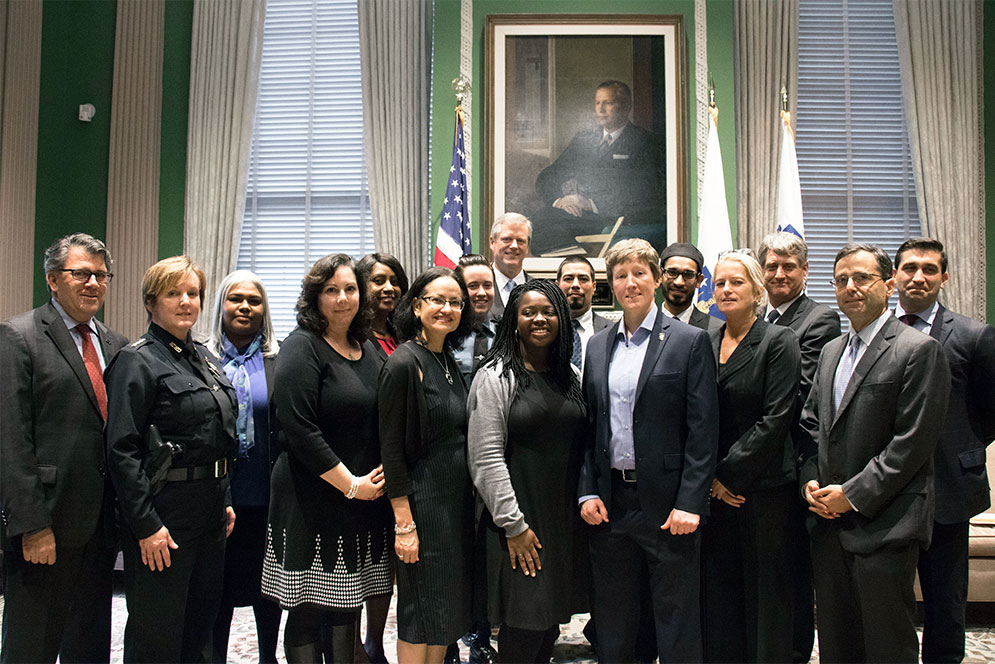BU Police Chief Appointed to Governor’s Hate Crimes Task Force
Kelly Nee brings wealth of experience as career law enforcement officer

BUPD Chief Kelly Nee (second from left) and other members of a new hate crimes task force with Massachusetts Governor Charlie Baker (center, back), who reestablished the group. Photo by Kristina McComb for the Office of the Governor
- BUPD chief appointed to state hate crimes task force
- Kelly Nee to help advise Governor Charlie Baker and administration
- Appointment comes after rise in hate crimes
In the wake of surging hate crimes in Massachusetts and nationally, Governor Charlie Baker has reestablished a task force on hate crimes originally created in the 1990s. Kelly Nee, chief of the Boston University Police Department (BUPD), is one of the 17 task force members appointed by Baker.
Baker swore in Nee and the other members Monday. “I am honored to represent Boston University as a member of this important and timely task force,” Nee says.
The governor brought back the dormant task force after the state’s most recent data, from 2015, recorded 424 hate crimes during that year, including 144 assaults. Last winter, Massachusetts set up a hotline for reporting hate crimes, which were spiking even further following Donald Trump’s election as president.
The task force will advise Baker and Lt. Governor Karyn Polito on how to address these crimes and support victims. It will meet at least quarterly and write an annual report with recommendations and suggestions for measuring progress.
Asked what she hopes to contribute, “I would hope to be able to provide a perspective as a career law enforcement officer,” Nee says. Before coming to BU, she was a deputy superintendent with the Boston Police Department who participated in security briefings with federal and state law enforcement officials.
She also helped draw up training and deployment plans for the Boston Marathon after the 2012 bombings that killed three and injured hundreds.
“I have had the pleasure of meeting and working with people from diverse backgrounds, sexual identities, ethnicities, and faiths,” Nee says. “I wholeheartedly believe that everyone should be able to go about their day-to-day lives without fear of being targeted for harassment or violence because of ignorance and hatred.
“All you have to do is look at events across the country to see divisiveness,” she says. “It’s extremely important that we protect the rights of individuals, even those we disagree with. This task force can explore ways to accomplish this safely and help formulate ways to improve prevention, investigation, and prosecution of hate crimes.”
Baker says the group members “represent different backgrounds and parts of our state to enhance our commitment to inclusive and tolerant communities.”
Among the task force members are police officers, representatives of advocacy groups (including Jewish, Muslim, and LGBTQ), the chancellor of the University of Massachusetts Dartmouth, and an Amherst College student.
Nee’s appointment is a “testament to her broad experience and highly esteemed work demonstrated during her law enforcement career,” says Peter Fiedler (COM’77), BU vice president for administrative services, who oversees the BUPD. Information shared between the chief and the task force, he says, “will not only benefit the Boston University community, but will demonstrate the University’s strong collaboration and commitment to the commonwealth’s efforts to reduce hate, bias, and other forms of discrimination.”
The BUPD chief’s work with state law enforcement and political leaders also includes serving on the Massachusetts attorney general’s task force on human trafficking and with a group that advised the US attorney on countering violent extremism.
Nee has been a sought-after speaker on the latter topic. She addressed the International Association of Chiefs of Police conference on Radicalization to Violent Extremism and the use of community policing in preventing such violence. Last year, she was on a panel at the National Security Conference, held at MIT, on Strategies for Preventing Terrorism and Hate Crimes in Your Community.
Comments & Discussion
Boston University moderates comments to facilitate an informed, substantive, civil conversation. Abusive, profane, self-promotional, misleading, incoherent or off-topic comments will be rejected. Moderators are staffed during regular business hours (EST) and can only accept comments written in English. Statistics or facts must include a citation or a link to the citation.